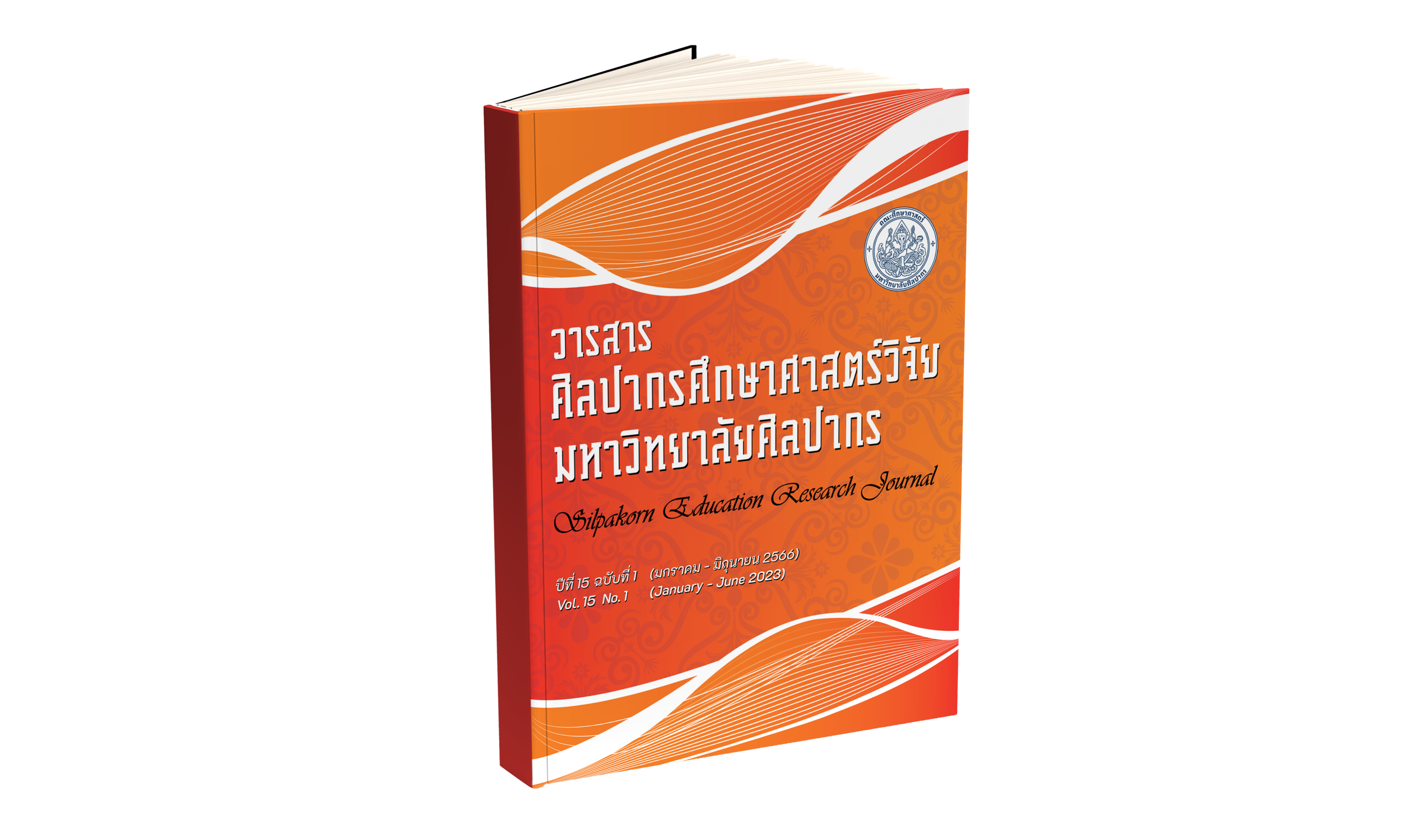การใช้กระบวนการสอนแบบดิกโทกลอสเพื่อส่งเสริมความสามารถด้านการเขียนภาษาอังกฤษ และความสุขในการเรียนสำหรับนักเรียนชั้นมัธยมศึกษาปีที่ 5
คำสำคัญ:
กระบวนการสอนแบบดิกโทกลอส, ความสามารถด้านการเขียนภาษาอังกฤษ, ความสุขในการเรียนบทคัดย่อ
การวิจัยครั้งนี้มีวัตถุประสงค์ 1) เพื่อเปรียบเทียบความสามารถด้านการเขียนภาษาอังกฤษของนักเรียน ชั้นมัธยมศึกษาปีที่ 5 ก่อนและหลังการเรียนโดยกระบวนการสอนแบบดิกโทกลอส และ 2) เพื่อศึกษาความสุขในการเรียนของนักเรียนชั้นมัธยมศึกษาปีที่ 5 ระหว่างเรียนและหลังเรียน กลุ่มตัวอย่างที่ใช้ในการวิจัย คือ นักเรียนระดับชั้นมัธยมศึกษาปีที่ 5/1 ภาคเรียนที่ 1 ปีการศึกษา 2565 โรงเรียนวังชิ้นวิทยา จำนวน 30 คน ได้มาจากการสุ่มแบบกลุ่ม เครื่องมือที่ใช้ในการวิจัย คือ แผนการจัดการเรียนรู้ที่ใช้กระบวนการสอนแบบดิกโทกลอส แบบทดสอบความสามารถด้านการเขียนภาษาอังกฤษแบบอัตนัย และแบบวัดความสุขในการเรียนของนักเรียนที่มีต่อการเรียนวิชาภาษาอังกฤษ วิเคราะห์ข้อมูลโดยการหาค่าเฉลี่ย ส่วนเบี่ยงเบนมาตรฐาน และค่าสถิติทดสอบที ผลวิจัยพบว่า 1) ความสามารถด้านการเขียนภาษาอังกฤษ หลังการเรียนโดยกระบวนการสอนแบบดิกโทกลอสหลังเรียนสูงกว่าก่อนเรียนอย่างมีนัยสำคัญทางสถิติที่ระดับ .05 และ 2) ความสุขในการเรียนวิชาภาษาอังกฤษ โดยใช้กระบวนการสอนแบบดิกโทกลอส ระหว่างเรียนและหลังเรียนอยู่ในระดับมาก
เอกสารอ้างอิง
Adipattaranan, N. (2006). Integration of Reading and Writing Skills in English. Chiang Mai University. (in Thai)
Arayaphan, S. (2004). The Dictogloss Approach: An Application Srinakharinwirot University English Major. Master of Arts Degree Thesis Program in Teaching English as a Foreign Language Srinakharinwirot University. (in Thai)
Boonsue, K. (1997). Happy Learning, Learning Reform Based on 5 Theories. Bangkok: Office of the National Education Commission Office of the Prime Minister. (in Thai)
Brindley, S. (2005). Teaching English. London: Routledge.
Brown, P. C. (2001). Interactive Dictatio. Annual Conference of the Japan Association for Language Teaching, Kokura.
Calkins, S. D. (1994). “Origins and Outcomes of Individual Differences in Emotion Regulation”. Monographs of the Society for Research in Child Development 59(2-3): 53–72: 250–283.
Diener, E., Lyubomirsky, L. and King, L. (2005). “The Benefit of Frequent Positive Affect: Dose Happiness Lead to Success?”. Psychological Bulletin 131(6): 803-855.
Dzaky Mubarak Fasya. (2015). Improving the Grade VIII Students’ Writing Skill of Narrative Text through Dictogloss at SMPN 1 Mungkid, Magelang in the Academic Year of 2014/2015. Master of Education Thesis Program in English Education Faculty of Languages and Arts Yogyakarta: Universits.
Farid, A. A. P. A., Setyarini, S. and Moecharam, N. Y. (2017). “The Implementation of Dictogloss Storytelling in Improving 8th Grade Students Writing Skill”. Journal of English and Education 5(1): 85-91.
Jacobs, G. and Small, J. (2003). “Combining Dictogloss and Cooperative Learning to Promote Language Learning”. The Reading Matrix 3(1): 25-29.
Khammanee, T. (2008). Strategies of Teaching: Knowledge for Effective Learning Process Management. Bangkok: Chulalongkorn University. (in Thai)
Kidd, J. R. (1992). How Adults Learn. New York: Association Press.
Kowal, M. and Swain, M. (1997). From Semantic to Syntactic Processing: How Can We Promote It in the Immersion Classroom?. NY: Cambridge University Press.
Layard and Noddings. (2006). Learning with Happiness. Cambridge University Press London.
Lim, W. L. and Jacobs, G. M. (2001). An Analysis of Students' Dyadic Interaction on a Dictogloss Task. ERIC Document Reproduction Service No. ED 456 649.
Manda, M. L. (2003). “Dictogloss: An Approach to TEFL”. Journal Analysis 4. [Online]. Retrieved March 2, 2022, from http://pasca.unhas.ac.id/jurnal_pdf/vol_4_2_jan03.
Meejang, A. and Panawong, S. (2010). “The Developmet of a Training Course Based on Problem - Based Learning for Second Key Stage English Teachers”.Journal of Education Naresuan University 12(2): 17-32.
Ministry of Education. (2008). Basic Education Core Curriculum B.E. 2551 (A.D. 2008). [Online]. Retrieved May 5, 2022, from http://academic.obec.go.th/images/ document/1559878925 _d_1.pdf. (in Thai)
Latif, N. K. (2016). The Use of Dictogloss Method in Improving the Students’ Vocabulary at the Second Grade of SMPN 20 BULUKUMBA. Alauddin State Islamic University of Makassar.
Nunan, D. (1991). Language Teaching Methodology: A Textbook for Teachers. New York: Prentice Hall.
Patel, M. F. and Jain, M. P. (2008). English Language Teaching Method Tools and Techniques. Jaipur: Sunrise Publisher and Distributors.
Piset, P. (2006). “A Causal Relationship Model of Factors Affecting Learning with Happiness for Grade 8 Students”. Journal of Educational Research and Measurement (4)1: 95-111. (in Thai)
Richard, C. J. and Renandya, A. W. (2002). Methodology in Language Teaching; An ontology of Current Practice. Cambridge: Cambridge University.
Seung Hee Jin. (2013). “A Study on the Effects of Dictogloss on English Writing in Korean Middle School”. Studies in English Education (18)2.
Smith, M. K. (2012). Dictogloss: A Multi-skill Task for Accuracy in Writing Trough Cooperative Learning. [Online]. Retrieved April 25, 2022, from http//www.thtjapan.orgproceeings2011 069-080_smith.pdf.
Tedick. (2001). Dictogloss Procedure. [Online]. Retrieved May 5, 2022, from https://carla.umn.ed u/cobaltt/modules/strategies/Dictogloss.pdf.
UNESCO. (2008). Education for All Global Monitoring Report 2009. Paris: UNESCO.
Vasiljevic, Z. (2010). “Dictogloss as an Interactive Method of Teaching Listening Comprehension to L2 Learners”. English Language Teaching 3(1): 41-52.
Wajnryb, R. (1990). Grammar Dictation. Hong Kong: Oxford University Press.
Wang, F.F. (2011). An Empirical Study of Dictogloss in English Writing Teaching of Higher Vocational Colleges. [Online]. Retrieved August 2, 2022 from http://www.globethesis. com/.
Wangchinwitthaya School. (2018). Self - Assessment Report 2018 . The Secondary Educational Service Area office 37 Phrae – Nan. (in Thai)
Weerawong, A. (2011). SWU Research Said Thai Students Learn English for Testing Rather than Applying in Daily Life. [Online]. Retrieved May 5, 2022, fromhttp://www.manager. co.th/ campus/viewnews.aspx?newsID=9540000155943.
Weir, C. J. (1990). Communicative Language Testing. New Jersey: Prentice Hall.
Wongyai, W. (2000). Educational Vision. Bangkok: SR Printing Partnership. (in Thai)
Yoosub, P. (2012). “The Development of Tertiary Students English Language Learning Autonomy through English for Communication and Study Skills Course”. SDU Research Journal Humanities and Social Science 8(2): 189-204. (in Thai)





